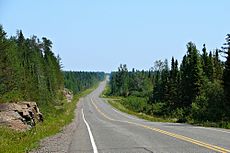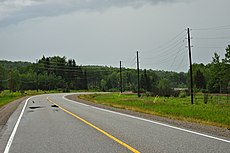This is a list of secondary highways in Thunder Bay District, most of which serve as logging roads or provide access to the isolated and sparsely populated areas in the Thunder Bay District of northern Ontario.
Highway 527
Secondary Highway 527, commonly referred to as Highway 527 is a provincial maintained secondary highway in the Canadian province of Ontario. It is one of the longest secondary highways in the province; only Highway 599 is longer. Highway 527 spans a distance of 235.1 km (146.1 mi) from a junction with Highway 11 and Highway 17, the Trans-Canada Highway, in the community of Shuniah just outside Thunder Bay, to the small, remote community of Armstrong and neighbouring Whitesand Indian Reserve.[1]
The Gull Bay First Nation occupies one of the few permanent settlements on Highway 527, Gull Bay Reserve, situated on the western shore of Lake Nipigon about 70 kilometres south of Armstrong. The highway also passes the start of Highway 811 along its route.
Highway 527 was created in the 1950s as a forest access road and designated Highway 800 in 1963. Throughout the 1960s, the route was gradually extended until it reached what is now Highway 811 in 1969. The route was designated Highway 527 in 1976. Except within the communities of Armstrong and Gull Bay, there are no services or development along this road.

Highway 580
Secondary Highway 580, commonly referred to as Highway 580 is a secondary highway in the Canadian province of Ontario. It is served to connect between Highway 11 near Beardmore to Poplar Lodge near Lake Nipigon. It is also known as The Spruce River Road.
Highway 582
Highway 582 is a short secondary highway in the Canadian province of Ontario, which serves to connect the small community of Hurkett to Highway 17, the main route of the Trans-Canada Highway through the area.
Highway 582 is itself a former route of Highway 17, which was given its current number when a new alignment of Highway 17 between the two endpoints was later constructed.
Highway 584
Secondary Highway 584, commonly referred to as Highway 584 is a secondary highway in the Canadian province of Ontario. The southern terminus is north of the town of Geraldton in Greenstone, while the northern terminus is at Warren Street in Nakina, a length of 53.1 kilometres (33.0 mi). The road is signed as Michael Power Boulevard, First Avenue North, Third Street North, and Center Street.

Highway 585
Highway 585 is a 36 kilometre road in the Thunder Bay District of Northwestern Ontario, starting at Trans-Canada Highway 11/17 in Nipigon. It travels northward, parallel to the Nipigon River, through the community of Cameron Falls to the Pine Portage Hydroelectric Power Plant.
Highway 586
Secondary Highway 586, commonly referred to as Highway 586 is a secondary highway in the Canadian province of Ontario. The western terminus is a dead end near the shores of the Shebandowan Lakes, while the eastern terminus is at an intersection with Highway 11, a length of 5.2 kilometres (3.2 mi). The route was assigned in 1956, when Highway 11 was known as Highway 120.
Highway 587
Highway 587 is a secondary highway 40 kilometres away from Thunder Bay on the Sibley Peninsula. It travels 15 kilometres in the Township Of Shuniah then 22 kilometres in the Sleeping Giant Provincial Park. It begins at pass lake truck stop at Highway 11/Highway 17, and ends at Silver Islet, where it makes a 6 km (3.7 mi) loop around to connect with itself. Locations along the route include Pass Lake, Silver Islet and a campground called Marie Louise Lake Campground.
History
Highway 587 started out as a logging road in the 1800s and a connection to the silver mines at Silver Islet, Ontario. Later about the 1870s Sleeping Giant Provincial Park was incorporated and Highway 587 was in the planning stages. Finally about 1940 it was finished. The route was assumed as a provincial highway in 1956.
Highway 588
Secondary Highway 588, commonly referred to as Highway 588, is a provincially maintained highway in the Canadian province of Ontario, located in Thunder Bay District.
Route description
Highway 588 is a 54.0-kilometre (33.6 mi) road in the Thunder Bay District of Northwestern Ontario, starting at Trans-Canada Highway 11/17 in Stanley, Ontario. It travels to approximately 10 kilometres west of the village of Suomi. The highway intersects with Highway 595 south of Hymers, Highway 590 in Nolalu, and Highway 593 between Nolalu and Suomi.
Major intersections
Highway 589
Highway 589, also known as Dog Lake Road, is a 31 kilometre road in the Thunder Bay District of Northwestern Ontario, starting at Highway 102 (Dawson Road) in Thunder Bay. It travels north to Dog Lake. The highway intersects with Highway 591 in Lappe.
Towns and Highways
Highway 590
Highway 590 is a 26 kilometre road in the Thunder Bay District of Northwestern Ontario, starting at Trans-Canada Highway 11/17 in Kakabeka Falls. It travels west for approximately 12 kilometres then turns due south to terminate at Highway 588 in Nolalu. It intersects with Highway 595.
Towns and Highways

Highway 591
Highway 591 is an 8 kilometre road in the Thunder Bay District of Northwestern Ontario, starting at Highway 589 in Lappe. It travels west then north and terminates at the corners of Gilbride and Island Lake Roads, 8 kilometres (5.0 mi) northwest of Lappe.
Highway 593
Highway 593 is a 52 kilometre road in the Thunder Bay District of Northwestern Ontario, starting at Highway 61, three kilometres north of the Pigeon River border crossing at the Canada–US border. It travels west then north and terminates at Highway 588 between Suomi and Nolalu.
Highway 595
Highway 595 is a 41 kilometre road in the Thunder Bay District of Northwestern Ontario, starting at Highway 597, 22 kilometres southwest of South Gillies. It travels west then north to Highway 590, 8 kilometres west of Kakabeka Falls. It intersects with Highway 588 south of Hymers and Highway 608 at South Gillies.
Towns and highways

Highway 597
Highway 597 is a 15.3-kilometre (9.5 mi) road in the Thunder Bay District of Northwestern Ontario, starting at Highway 595 in the Cloud Lake area. It travels north to Highway 608, east of South Gillies.
Highway 608
Secondary Highway 608, commonly referred to as Highway 608, is a secondary highway in the Thunder Bay District of Northwestern Ontario, starting at Highway 595 in South Gillies. It travels 19.0 kilometres (11.8 mi) east to Highway 61, 5 km (3.1 mi) south of Highway 130 in Neebing, Ontario at the community of Moose Hill.
Towns and highways
Highway 614
Secondary Highway 614, commonly referred to as Highway 614, is a secondary highway in the Canadian province of Ontario, located in Thunder Bay District. The route connects Highway 17 (the Trans-Canada Highway) east of Marathon with the mining town of Manitouwadge, where it ends at Adjala Avenue. The route is 51.8 kilometres (32.2 mi) in length.[1] Highway 614 was assumed in early 1956.[2][3]

Highway 625
Secondary Highway 625, commonly referred to as Highway 625, is a secondary highway in the Canadian province of Ontario, located in Thunder Bay District. The route begins at Tamarac Drive in the community of Caramat. It travels north 29.6 kilometres (18.4 mi) and ends at Highway 11 (the Trans-Canada Highway) approximately 16 kilometres (9.9 mi) east of Longlac.[1] Highway 625 was assumed on April 17, 1958.[4]
Highway 627
Secondary Highway 627, commonly referred to as Highway 627, is a secondary highway in the Canadian province of Ontario, located in Thunder Bay District. The route begins at the visitor's centre for Pukaskwa National Park, from which it travels north 13.2 kilometres (8.2 mi) to end at Highway 17 (the Trans-Canada Highway) just east of Marathon.[1] Highway 627 was assumed on July 17 and July 30, 1958, connecting Heron Bay with Highway 17.[5] It was extended south through the Ojibways of the Pic River First Nation to Pukaskwa National Park circa 1982.[6]

Highway 628
Secondary Highway 628, commonly referred to as Highway 628, is a 7.3-kilometre (4.5 mi) secondary highway in the Thunder Bay District of Northwestern Ontario, starting at Trans-Canada Highway, Highway 11/Highway 17 approximately 11 kilometres (6.8 mi) southeast of Nipigon. It travels east to the town of Red Rock.
Highway 628 was assumed by the Department of Highways, predecessor to the Ministry of Transportation on July 28, 1961.[7] It remained unchanged from then until 2015, when construction began on four laning Highway 11/17 between Red Rock Road 9 and Stillwater Creek. The route was extended approximately 350 m (1,150 ft) west in June 2019 to the newly opened four lane highway.[8]

Highway 643
Secondary Highway 643, commonly referred to as Highway 643, is a secondary highway in the Canadian province of Ontario, located in Thunder Bay District. Its total length is approximately 19.6 kilometres (12.2 mi) and runs roughly on a northwest–southeast orientation. The northern terminus intersects Exton Road northwest of Aroland First Nation while the southern terminus intersects Highway 584 near Exton. A proposed all-season access road would connect Marten Falls First Nation to Highway 643.[10]
Highway 643 was assumed by the Department of Highways, predecessor to the modern Ministry of Transportation, in 1963. Although a short 1 km section within Danford Township was assumed on November 7, the majority of its length through Rupert Township and Exton Township was assumed on November 21.[9]
References
- ^ a b c d e f g h i j k l m n o p q r s t u Ministry of Transportation of Ontario (2016). "Annual Average Daily Traffic (AADT) counts". Retrieved February 1, 2021.
- ^ Ontario Road Map (Map). Cartography by C.P. Robins. Ontario Department of Highways. 1956.
- ^ "Ontario Secondary Roads Now Designated 500, 600". The Globe and Mail. Vol. 112, no. 33, 119. February 4, 1956. p. 4.
Two new Ontario road numbers appear on the province's 1956 official road map which will be ready for distribution next week. The new numbers are the 500 and 600 series and designate hundreds of miles of secondary roads which are wholly maintained by the Highways Department. More than 100 secondary roads will have their own numbers and signs this year. All of these secondary roads were taken into the province's main highways system because they form important connecting links with the King's Highways
- ^ Ontario Department of Highways (March 31, 1959). "Appendix No. 3A – Schedule of designations and Re-designations of Sections of the King's Highway and Secondary Highway Systems for the Fiscal Year Ending March 31, 1961". Annual Report (Report). pp. 237–239. Retrieved February 7, 2021.
- ^ Ontario Department of Highways (March 31, 1959). "Appendix No. 3A – Schedule of designations and Re-designations of Sections of the King's Highway and Secondary Highway Systems for the Fiscal Year Ending March 31, 1959". Annual Report (Report). pp. 237–239. Retrieved February 7, 2021.
- ^ Ontario Road Map (Map). Cartography by Photogrammetrey Office. Ministry of Transportation and Communications. 1982–83. § M9.
- ^ a b Ontario Department of Highways (March 31, 1961). "Appendix No. 3A – Schedule Of designations And Re-designations Of Sections of the King's Highway and Secondary Highway Systems for the Fiscal Year Ending March 31, 1961". Annual Report (Report). pp. 241–242. Retrieved February 7, 2021.
- ^ Widening of Highway 11/17 section ahead of schedule, reports MTO
- ^ a b Ontario Department of Highways (March 31, 1964). "Appendix No. 3A – Schedule of Assumptions of Sections". Annual Report (Report). p. 269. Retrieved February 8, 2021.
- ^ "Marten Falls Access Road Project Overview".



